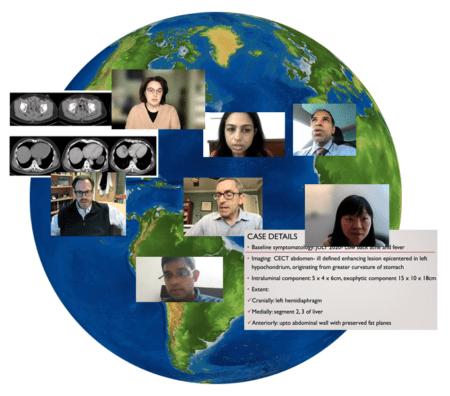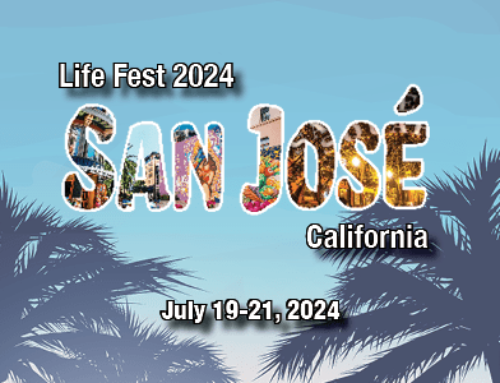 The Life Raft Group GIST Virtual Tumor Board was founded in 2014 when the LRG partnered with the National Institutes of Health (NIH) to launch the first Pediatric GIST Virtual Tumor Board. This created a vehicle that brought together leading experts worldwide to convene and discuss challenging cases in a secure virtual environment while serving as an educational resource for local physicians. The participants virtually access radiology films such as CT scans and other necessary medical reports to help review the particular case and provide their expert suggestions. The virtual tumor board was originally only held for SDH-deficient and pediatric cases, however, due to the success of the reviews, the LRG expanded its help to include adult cases.
The Life Raft Group GIST Virtual Tumor Board was founded in 2014 when the LRG partnered with the National Institutes of Health (NIH) to launch the first Pediatric GIST Virtual Tumor Board. This created a vehicle that brought together leading experts worldwide to convene and discuss challenging cases in a secure virtual environment while serving as an educational resource for local physicians. The participants virtually access radiology films such as CT scans and other necessary medical reports to help review the particular case and provide their expert suggestions. The virtual tumor board was originally only held for SDH-deficient and pediatric cases, however, due to the success of the reviews, the LRG expanded its help to include adult cases.
The first tumor review board for 2022 was held in April. There were four cases presented from all over the world, further emphasizing the importance of virtual reviews. These cases highlighted new characteristics of GIST and cases that were atypical.
The first case was a patient from Illinois (USA) with a primary KIT Exon 11 mutation that had developed a secondary KIT Exon 17 mutation as well as a JAK3 mutation. This patient tried all four medications available (Gleevec, Sutent, Stivarga and Qinlock) with little response. Progression continued in new locations including the omentum, liver, peritoneum, and pelvis as well as localized progression in the stomach. Unsure of what next treatment options were possible, the case was presented to the tumor review board where suggestions of performing ctDNA to understand the genomic profile of the patient was suggested, along with recommendations of getting enrolled and even waitlisted on some new clinical trials available such as BAY1163877 (rogaratinib) and Theseus trial (THE-630). Additional suggestions included looking into enrollment for the Cogent trial (CGT3486) as well as options of combination drugs like a mTOR inhibitor & imatinib, if the toxicity is tolerable.
The second case was a patient from New Delhi (India) who presented with a very rare GIST. The patient, despite having multiple Next-Generation Sequencing (NGS) testing performed, continued to show as wildtype. The patient’s genomic findings showed a CDKN2A loss, CDKN2B loss and a TP53 R282W. The patient failed all treatment options available in India and continues to progress. This case sparked immense interest among all the participants and proved to be a very difficult case. Suggestions of retesting the tissue for fusions and performing a complete germline test was mentioned, despite the test having been done more than once prior with no results. The lack of access to medication and trials was highlighted in this case and the importance of expanding the availability of medications was stressed. Additional suggestions of trying off-label medications like pazopanib or cabozatinib, if available, were discussed as well as looking at more fusions including FGFR or NTRK and checking VEGF medications due to the TP53 mutation.
The third case was a patient from Thailand who presented with a very aggressive GIST. With the help of The Life Raft Group, this patient was able to get a second opinion from the specialists at AIIMS, New Delhi, India and receive mutational testing. The mutational test showed that the patient had a primary KIT Exon 11 with a secondary KIT Exon 17. Lack of access to medication was again highlighted showing how difficult it is for some patients to receive life-saving medication. In addition, the difficulty for patients to obtain medication needed for their disease at an affordable price was also discussed. Patients cannot continue to pay outrageous prices for access to medication that is vital to their well-being. A call to action for pharmaceutical companies is needed and better financial assistance is required.
The experts present also commented on the difficulty of caring for international patients due to the lack of access to certain medications and also trials that the patient may benefit from. Suggestions for this patient were to keep the patient’s tolerance as a priority since the patient has an aggressive disease that was significantly affecting quality of life. Discussion focused on regorafenib with a cycling schedule and modifying the dosage for tolerance as well as the option of radiotherapy with the combination of a TKI treatment since radiotherapy may be used to stabilize disease locally. This patient had already experienced multiple resections so, with the quality of life in mind, medical therapy was mentioned as the best course for patient. Additional suggestions of sorafenib were made (if available, again emphasizing the need for access to medications) combined with TOR inhibitor and radiation as a possibility. Other off-label drugs including cabozatinib, ripretinib or even re-trying Sutent and titrating the dosage for tolerability were also suggested.
The last case was a patient from Arizona (USA) who was diagnosed with GIST in 2010 and showed a KIT Exon 11 mutation. Patient showed response to adjuvant imatinib for about five years when they showed progression and continued to receive mixed scan results (growth and new tumors). Additional mutational testing showed that the patient now had developed secondary mutations in KIT Exon 13 and KIT Exon 17. The disease continued to show progression to the liver, pelvis, lungs, spine/bone. Patient unfortunately failed all medications available (Gleevec, Sutent, Stivarga and Qinlock) and continues to show progression.
The patient’s doctor turned to the experts in hopes for suggestions on what next steps could be for the patient. Discussions included increasing the patient’s current medication of Qinlock which patient was at this time taking once daily, to increase it to BID (twice daily) and see if the patient shows response. Additional suggestions included enrolling patient into MSKCC’s two available trials for GIST patients, Theseus (THE-630) and BAY1163877 (rogaratinib). Despite spots not being open, the experts encouraged the enrollment to ensure all bases were covered. The presenting doctor asked the experts’ opinion re-trying Stivarga or trying Qinlock BID and the experts suggested prioritizing BID of Qinlock before re-challenging Stivarga.
Global reach is one of LRG’s main priorities and advocating for access of care, treatment and affordable medications. With the LRG’s relationships with medical experts and institutions in many countries, patients and doctors who are out of options and are unsure of next steps can tap into our large community of the world’s leading GIST experts who are part of our Virtual Tumor Boards and are willing to share their suggestions. This forum also allows the LRG to be the mediator, bringing forth challenging and rare cases to experts, calling attention to new characteristics of GIST and working together with GIST experts to accelerate research and build creative treatment approaches.
For more information on our virtual tumor boards or if you would like to present a case in an upcoming tumor board, please contact Sahibjeet Kaur, Director of Data Management & Research at skaur@liferaftgroup.org




